一般疑问句、特殊疑问句
一般疑问句和特殊疑问句之间有何不同?

一般疑问句和特殊疑问句之间有何不同?一般疑问句和特殊疑问句是用于提问的两种不同类型的语句。
它们在结构和使用方式上有一些不同之处。
一般疑问句一般疑问句用于询问一般情况下是否是正确的,通常以肯定形式的陈述句为基础,然后在句首加上助动词或be动词来构成疑问句。
以下是一般疑问句的结构和示例:- 助动词 + 主语 + 其他部分?- Be动词 + 主语 + 其他部分?例如:- Are you going to the party?- Does she like ice cream?- Can they swim?一般疑问句的回答可以是肯定或否定的,通常用"Yes"或"No"来回答。
特殊疑问句特殊疑问句用于询问特定的信息或细节,通常以特殊疑问词开头,并改变句子的语序。
以下是特殊疑问句的结构和示例:- 特殊疑问词 + 助动词/Be动词 + 主语 + 其他部分?特殊疑问词包括:what, when, where, why, who, whom, which, how。
例如:- What is your favorite color?- When did they arrive?- Where are you going?特殊疑问句的回答需要提供详细的信息,而不仅仅是"Yes"或"No"。
总结一般疑问句用于询问一般情况下是否是正确的,结构基于肯定形式的陈述句,并在句首加上助动词或be动词。
特殊疑问句用于询问特定的信息或细节,结构以特殊疑问词开头,并改变句子的语序。
了解这两种疑问句的区别可以帮助我们更好地使用和理解它们。
一般疑问句和特殊疑问句完整版
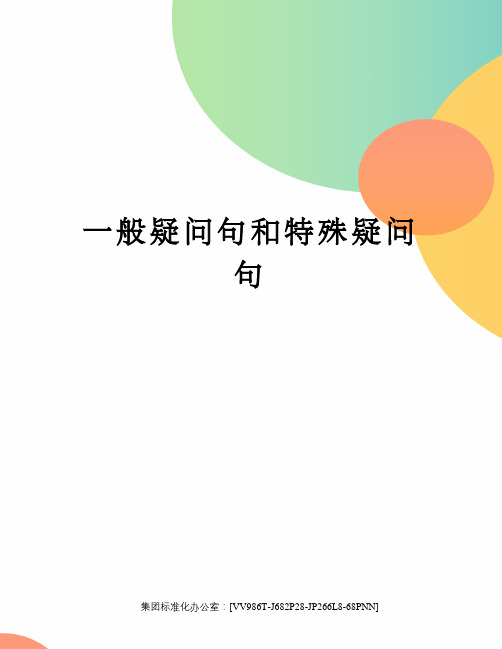
一般疑问句和特殊疑问句集团标准化办公室:[VV986T-J682P28-JP266L8-68PNN]一般疑问句与特殊疑问句Date:_______ name:_______一、【一般疑问句】1. 定义:用be、助动词或情态动词置于句首,并以“Yes,…”,或“No,…”或相当于yes / no回答的问句称为一般疑问句.2. 含系动词be的一般疑问句的构成:Be +主语+其它注意:am 只能跟在第一人称的单数 I 后面;are 搭配 you,不管you是单数还是复数;is 跟在第三人称单数 he, she, it后面Eg: I'm in Class 2, Grade 7.→ Are you in Class 2, Grade 7 (如遇第一人称,最好将其置换成第二人称)It's a map of China.→Is it a map of China这是一幅中国地图吗3. 含实义动词的一般疑问句的构成:Do/Does +主语 + 动词原形 + 其它注意:主语为第三人称单数,谓语动词为一般现在时单数第三人称形式"v-(e)s"时,用does,并要将谓语动词变回原形(如has→have,likes→like等);有时陈述句中的some还要变作any等。
如:Eg: She lives in Beijing. →Does she live in BeijingI like English. →Do you like EnglishThere are some books on my desk.→Are there any books on your desk4. 含情态动词的一般疑问句的构成:情态动词+主语+动词原形+其它Eg: I can spell it. →Can you spell it?I will do that for her. →Will you do that for her?She can drive. →Can she drive5. 一般疑问句的应答动词保持一致。
一般疑问句与特殊疑问句
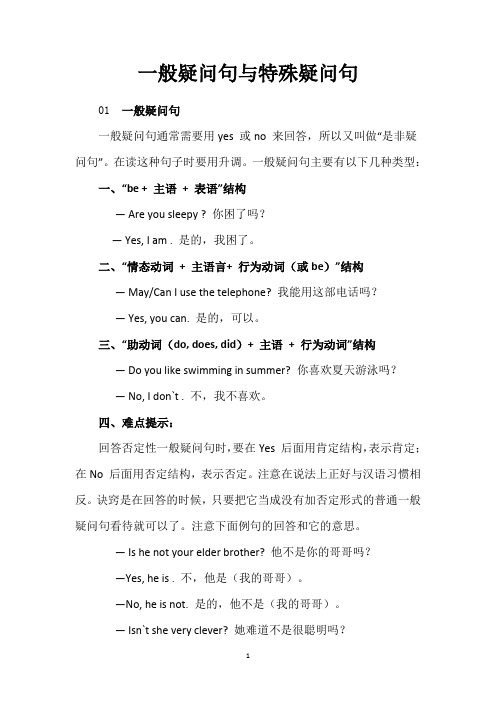
一般疑问句与特殊疑问句01一般疑问句一般疑问句通常需要用yes 或no 来回答,所以又叫做“是非疑问句”。
在读这种句子时要用升调。
一般疑问句主要有以下几种类型:一、“be + 主语+ 表语”结构— Are you sleepy ? 你困了吗?— Yes, I am . 是的,我困了。
二、“情态动词+ 主语言+ 行为动词(或be)”结构— May/Can I use the telephone? 我能用这部电话吗?— Yes, you can. 是的,可以。
三、“助动词(do, does, did)+ 主语+ 行为动词”结构— Do you like swimming in summer? 你喜欢夏天游泳吗?— No, I don`t . 不,我不喜欢。
四、难点提示:回答否定性一般疑问句时,要在Yes 后面用肯定结构,表示肯定;在No 后面用否定结构,表示否定。
注意在说法上正好与汉语习惯相反。
诀窍是在回答的时候,只要把它当成没有加否定形式的普通一般疑问句看待就可以了。
注意下面例句的回答和它的意思。
— Is he not your elder brother? 他不是你的哥哥吗?—Yes, he is . 不,他是(我的哥哥)。
—No, he is not. 是的,他不是(我的哥哥)。
— Isn`t she very clever? 她难道不是很聪明吗?— Yes, she is. 不,她很聪明。
— No, she is not . 是,她不聪明。
02特殊疑问句一、特殊疑问句是用来提出来特定问题的疑问句,要求听到问题的人针对特定情况来做具体的回答,不能像一般疑问句一样简单地用Yes 或No 来回答,特殊疑问句要用降调来读。
二、特殊疑问句的结构:特殊疑问词+ 一般疑问句Who do English homework in the evening?谁晚上做英语家庭作业?What do you do in the evening?你晚上做什么?What homework do you do in the evening?你晚上做什么家庭作业?When do you do English homework?你什么时候做英语家庭作业?三、注意:对人提问时wh o“谁”对所属(谁的)提问用whose“谁的”对哪一个提问用which“哪一个”对时间提问用when“什么时候”或what time“几点”对物体提问用what“什么”对地点提问用where“哪里”对原因提问用why“为什么”对方式提问用how“怎么样”对数量提问用how many“多少”(用于可数名词复数)或how much“多少”(用于不可数名词)四、难点提示1、以why开头的特殊疑问句否定形式常用于表示建议、请求等。
英语中一般疑问句和特殊疑问句的区别

英语中一般疑问句和特殊疑问句的区别一般疑问句和特殊疑问句是英语语法中两种不同类型的问句。
一般疑问句是用于向对方询问某个陈述句是否属实,通常需要以助动词或be动词开头,并使用倒装结构。
例如:
1.You like coffee.(你喜欢咖啡。
)
2.Do you like coffee?(你喜欢咖啡吗?)
在这个例子中,将原陈述句中的"like"动词提取出来,并使用助动词"do"形成疑问句。
特殊疑问句则是用于询问某个特定信息或事实的问句,通常以特殊疑问词开头。
特殊疑问词包括who(谁)、what(什么)、when (何时)、where(哪里)、why(为什么)、how(如何)。
例如:
1.She went to the party.(她去了派对。
)
2.Where did she go?(她去了哪里?)
在这个例子中,特殊疑问词"where"引导了疑问句,并询问了去派对的地点。
总结起来,一般疑问句主要用于确认陈述句的真实性,通常采用助动词或be动词的倒装形式,而特殊疑问句则用于询问特定信息或事实,以特殊疑问词开头。
一般疑问句和特殊疑问句知识点总结

一般疑问句和特殊疑问句知识点总结疑问句最常见的疑问句有两类:1.一般疑问句:可以用Yes和No回答的问句2.特殊疑问句:以特殊疑问词7w1h(比如what/how等等)开头的疑问句一般疑问句(句型结构会根据时态发生相应的细微变化,但总体框架不变)①be动词+主语+其他?(注意be动词和主语的匹配)例句:Areyoua policeman?你是个警察吗?-Yes, I am.是的,我是。
-No, I am not.不,我不是。
②情态动词+主语+动词原形+其他?(注意情态动词后面跟动词原形)例句:Canyouswim?你会游泳吗?-Yes, I can.是的,我会。
-No, I can’t.不,我不会。
③助动词+主语+动词原形+其他?(注意助动词和主语的匹配)例句:Doyoulikedancing?你喜欢跳舞吗?-Yes, I do.是的,我喜爱。
-No, I don’t.不,我不喜欢。
Doyougoto school every day?你每天去学校吗?做句型转换的方法(如何将陈述句变成一般疑问句):先看句子中是否有be动词或者情态动词A.如果有be动词或者情态动词,对照一般疑问句句型①/②将be动词或者情态动词提到句首,其他局部依次照抄B.如果没有be动词或者情态动词,对照一般疑问句句型③句首+助动词(注意是不是要和主语婚配变化),其他局部依次照抄,注意原来的动词要变为真相#无论是哪种情况,都要注意第一人称要酿成第二人称,第二人称要酿成第一人称(you和I的切换)非凡疑问句(句型结构会根据时态发生相应的细微变化,但总体框架不变)①特殊疑问词(作主语)+谓语+其他?(陈述句语序)例句:Whois reading a book?谁正在读书?Whichis the biggest?哪个是最大的?Wholikes dancing?谁喜爱跳舞?②非凡疑问词(作主语修饰语)+主语+谓语+其他?(陈说句语序)例句:Whosebagis red?谁的包是红色的?How manypeoplework in the school?有多少人在学校工作?③特殊疑问词+一般疑问句(详见上面的一般疑问句结构)?(此情况为当特殊疑问词代替的部分不是主语或者主语修饰语时)例句:What areyoudoing?你在做什么?What colour doyoulike?你喜欢什么颜色?做句型转换的方法(如何将句子转变成特殊疑问句):先看划线局部是不是为句子中的主语或者主语修饰语A.如果是主语,对照非凡疑问句句型①划线部分用特殊疑问词代替,其他部分照抄(该疑问句为陈述句语序)B.如果是主语修饰语,对照特殊疑问句句型②划线部分用特殊疑问词代替,其他部分照抄(该疑问句为陈述句语序)C.如果不是主语或者主语修饰语,对照特殊疑问句句型③先将原来的陈述句变成一般疑问句(如果本来就是一般疑问句就不需要再做修改)划线局部用非凡疑问词替代再将特殊疑问词提前到句首#如果划线局部是动词或者动词短语,表示做什么事,那变为非凡疑问词的时候要用do what替代非凡疑问词主要分为两类:wh-(wh开头的疑问词)和how - (how开头的疑问词)疑问词whatwhowhosewhichwherewhenwhywhat for what colour what day what date what time 含义什么谁谁的哪一个在哪里什么时候为什么为什么什么颜色星期几什么日期几点钟用法问东西问人问归属问挑选问地址问时间问原因。
一般疑问句与特殊疑问句的区别是什么?
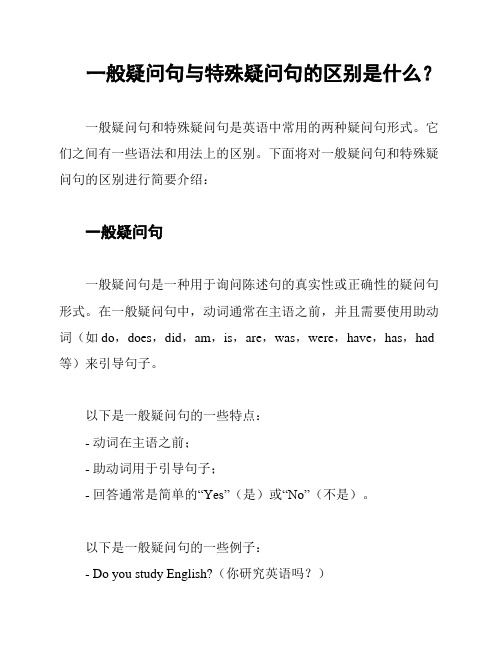
一般疑问句与特殊疑问句的区别是什么?一般疑问句和特殊疑问句是英语中常用的两种疑问句形式。
它们之间有一些语法和用法上的区别。
下面将对一般疑问句和特殊疑问句的区别进行简要介绍:一般疑问句一般疑问句是一种用于询问陈述句的真实性或正确性的疑问句形式。
在一般疑问句中,动词通常在主语之前,并且需要使用助动词(如do,does,did,am,is,are,was,were,have,has,had 等)来引导句子。
以下是一般疑问句的一些特点:- 动词在主语之前;- 助动词用于引导句子;- 回答通常是简单的“Yes”(是)或“No”(不是)。
以下是一般疑问句的一些例子:- Do you study English?(你研究英语吗?)- Does she like ice cream?(她喜欢冰激凌吗?)- Did they go to the park?(他们去公园了吗?)- Are you ready?(你准备好了吗?)特殊疑问句特殊疑问句是一种用于询问特定信息或详细情况的疑问句形式。
在特殊疑问句中,疑问词(如what,where,when,why,who,whom,which,how等)通常在句子中起到引导作用,并且一般不需要使用助动词。
以下是特殊疑问句的一些特点:- 疑问词在句子中起到引导作用;- 不需要使用助动词;- 回答通常是提供具体信息。
以下是特殊疑问句的一些例子:- What is your name?(你叫什么名字?)- Where do you live?(你住在哪里?)- When is your birthday?(你的生日是什么时候?)- Why did they leave early?(他们为什么提前离开了?)- How did you learn to play the piano?(你是怎么学会弹钢琴的?)总结:一般疑问句和特殊疑问句在形式上有一些差别。
一般疑问句使用助动词,询问陈述句的真实性或正确性,回答通常是“Yes”或“No”;特殊疑问句使用疑问词,询问特定信息或详细情况,回答通常是提供具体信息。
一般和特殊疑问句

• when
• 为什么
• why
• 如何
• how
特殊疑问词短语
1. what time:
• 问时间点
2. what colour
• 什么颜色)
3. what weather
• 什么天气
4. 什么学科
• what subject
5. 多少
• How many/much
6. 多长
• How long:
0
●动词的及物性
●主谓一致
出现严重中的语法和选词错误, 导致误解或不能理解所表达的信 息,比如: ●疑问词错误 ●结构不完整,而且意义不连贯
不影响理解所表达的信息 导致不能理解所表达的信息
0.5 基本按照要求传递了信息
信0 息
不能按照要求传递信息
1.5 按照要求传递了信息
基本按照要求传递信息(漏
1
了一、两点次要信息、或添
Who should be responsible for this matter?
2.谁想和我一起去购物? Who wants to go shopping with me?
3. 那个女孩是谁?
Who is that girl?
对物主代词和名词所有格提问用whose。“谁的
1.这是谁的英语书? Whose English book is this?
加了无关信息)
0
不能按照要求传递信息
情景介绍
• 角色:你是女士的同事
• 任务:(1)和女士谈论生活和明晚去参加 音乐会的相关事情
•
(2)根据谈话内容回答问题
7:18
明天晚上的音乐会你会想去吗?
Would you want to go to the concert tomorrow? 我们在哪儿见面?
一般疑问句和特殊疑问句

大观语法沙龙苑CRAZY ENGLISH! 一般疑$句!特殊疑问%北京杨良疑问句即用于提出问题的句子。
在英语中,一般 疑问句和特殊疑问句是最常见的两种疑问句,现将其 概念、构成及答语等简介如下:一 ^一般疑问句能用ye s/no 回答的问句叫一般疑问句。
一般疑问句往往读升调,译成汉语时常含有“……吗?”之意。
1. 一般疑问句的构成(1) 含连系动词be (am ,is ,are ,was ,were )的一般疑问句,构成形式:Be +主语+表语+其他成分?例如:①Is it a map of China?这是一幅中国地图吗?② Were they here only a few minutes ago?只是几分钟前他们在这里了吗?(2)含情态动词的一般疑问句,构成形式:情态动 词3主语3实义动词3其他成分?例如:① Can you sing English songs?你会唱英语歌吗?② May I have your name?我能知道你的名字吗?(3) 含实义动词的一般疑问句,构成形式:助动词 (Do / Does / Did / Will / Shall / Have / Has / Had /A m /Is /A re /W a s /W e re )+主语+实义动词的适 当形式+其他成分?例如:① Does she live in Beijing?她住在北京吗?② Do you like listening to English songs ?你喜英语歌吗?③ Have they found the missing child yet?他们]找到失踪的孩子了吗?(4) 少数□语化的一般疑问句。
如问一个与前文 相同的问句时,可省略成% A nd you?”或“What / How about...?” 等。
2. —般疑问句的应答肯定的答句形式:Yes ,主语+连系动词(情态动词、助动词)+其他成分;否定的答句形式:No,主语+ 连系动词(情态动词、助动词)+ not(not 常与前边的词 缩写)+其他成分。
一般疑问句特殊疑问句
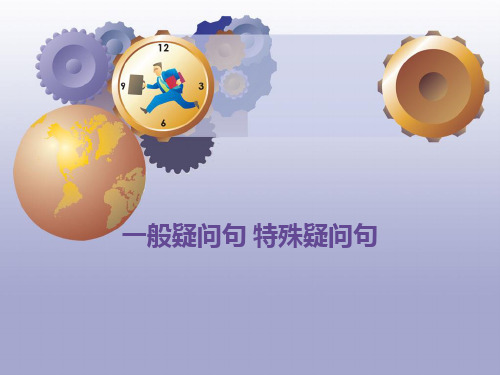
• 2.没be就用do/does/did. • 针对一般现在时和一般过去时 • eg:1.They plant many trees on the hill. • Do they plant many trees on the hill? • 注:如果是动词原形,把do放在句首。 • 2.He goes to school early everyday. • Does he goes to school early everyday? • 动词是单三形式的,要把does放于句首,动词单三变原形。
• 3.They arrived here 3 hours ago.
• Did they arrive here 3 hours ago? • 动词是过去式的,要把did提前,同时,句中的过去式还原成原
形。
特殊疑问句
• 1.定义:以特殊疑问词开头,对句中某一成分提 问的句子叫特殊疑问句。
• 2.常用的疑问词有:what 、who 、whose 、which 、 when 、where 、how 、why等。
问句了。 • eg:1.He is a student. • Is he a student? • 2. They are sweeping the floor. • Are they sweeping the floor? • 3.There is a river in the picture. • Is there a river in the picture? • 4.The students were dancing in the park yesterday. • Were the students dancing in the park yesterday?
Who谁——Whose谁的(加se) • Why为什么 • When什么时候 • Where在哪里 • Which哪一个 • What什么 ( What time什么时间 What color什么颜色) • How 怎么样 • How many多少{数量} • How much多少钱{价格},多少(对不可数名词进行提问) • How long多长 • How often多少次 • How big多大 • How heavy多重{重量 • How far多远{路程}
一般疑问句和特殊疑问句 (附练习题及答案

How do you go home?
On foot.
how old
多大
问年龄
How old is he?
6 years old.
how many
多少
问数量
How many books are there in the bookcase?
There are 10.
how much
多少
问价钱
How much is the book?
9. Mrs. Li and Kitty watch television at night.
Do Mrs. Li and Kitty watch television at night? Yes, they do. / No, they don’t.
10. I can finish my homework by myself.
中小学英语一般疑问句和特殊疑问句详解(附练习题及答案)
一、一般疑问句
1、定义:用Yes或No作答的疑问句叫一般疑问句。
2、特点:
1>以be动词am/is/are、助动词do/does、情态动词can/could/may、there be(即there is /are)开头;
例:Is your father a teacher?/ Does Tom like apples? /Can Jenny speak English? /Is there a book on the desk?
There is a book on the desk.→Is there a book on the desk?
2>如果句中没有be动词或情态动词,句首加do的相应形式(do、does、did),且原句的谓语动词要变回原形。
一般疑问句、特殊疑问句的构成形式及基本用法
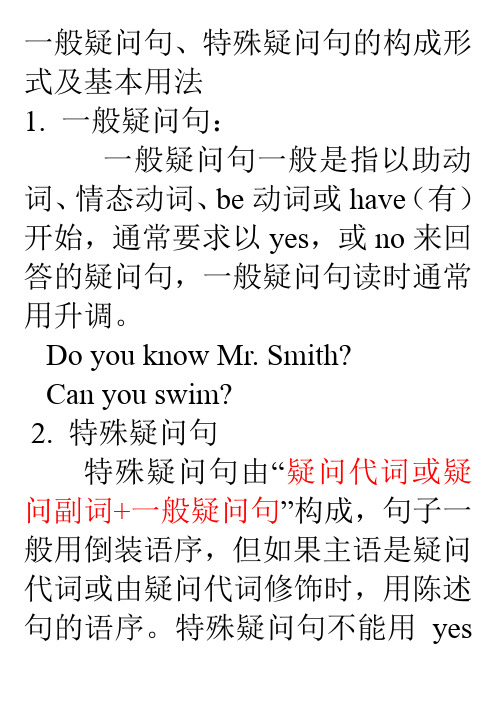
一般疑问句、特殊疑问句的构成形式及基本用法1. 一般疑问句:一般疑问句一般是指以助动词、情态动词、be动词或have(有)开始,通常要求以yes,或no来回答的疑问句,一般疑问句读时通常用升调。
Do you know Mr. Smith?Can you swim?2. 特殊疑问句特殊疑问句由“疑问代词或疑问副词+一般疑问句”构成,句子一般用倒装语序,但如果主语是疑问代词或由疑问代词修饰时,用陈述句的语序。
特殊疑问句不能用yes或no回答,读时用降调。
例如:Who is on duty today?How long have you been in Beijing? What time do you get up every morning?What must I do now?3. 注意疑问词的选择1. 问“谁”用who或whom。
如:Who is a doctor?Li Lei is a doctor.(对主语提问用who,对宾语提问用who,whom均可)2. 问“谁的”用whose。
如:Whose book is this?This is his book.3. 问“地点”用where。
如:Where is the ball?The ball is under the bed.4. 问“原因”用why。
如:Why didn't he come?He didn't come because he was ill.5. 问“身体状况”用how。
如:How are you?I'm fine.6. 问“方式”用how。
如:How did he do it?He did it in that way.7. 问“程度”用“how +被修饰语”。
如:How wide is the river?The river is five metres wide.8. 问“多少”用how much或how many。
一般疑问句和特殊疑问句
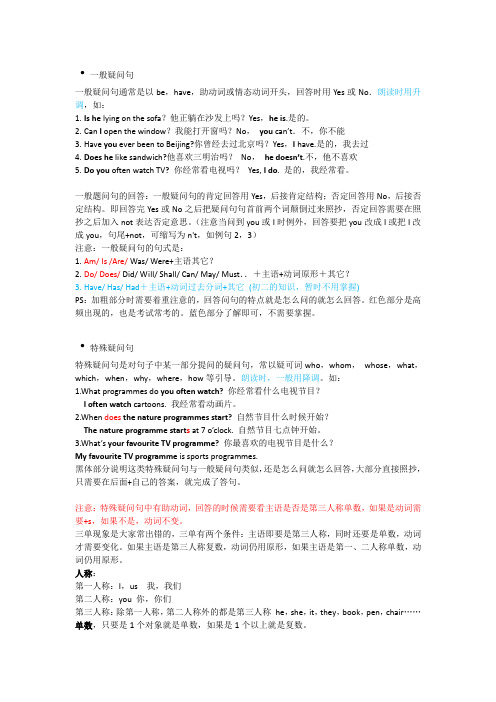
·一般疑问句一般疑问句通常是以be,have,助动词或情态动词开头,回答时用Yes或No.朗读时用升调,如:1.Is he lying on the sofa?他正躺在沙发上吗?Yes,he is.是的。
2.Can I open the window?我能打开窗吗?No,you can’t.不,你不能3.Have you ever been to Beijing?你曾经去过北京吗?Yes,I have.是的,我去过4.Does he like sandwich?他喜欢三明治吗?No,he doesn’t.不,他不喜欢5.Do you often watch TV? 你经常看电视吗?Yes, I do. 是的,我经常看。
一般题问句的回答:一般疑问句的肯定回答用Yes,后接肯定结构;否定回答用No,后接否定结构。
即回答完Yes或No之后把疑问句句首前两个词颠倒过来照抄,否定回答需要在照抄之后加入not表达否定意思。
(注意当问到you或I时例外,回答要把you改成I或把I改成you,句尾+not,可缩写为n't,如例句2,3)注意:一般疑问句的句式是:1.Am/ Is /Are/ Was/ Were+主语其它?2.Do/ Does/ Did/ Will/ Shall/ Can/ May/ Must..+主语+动词原形+其它?3.Have/ Has/ Had+主语+动词过去分词+其它(初二的知识,暂时不用掌握)PS:加粗部分时需要着重注意的,回答问句的特点就是怎么问的就怎么回答。
红色部分是高频出现的,也是考试常考的。
蓝色部分了解即可,不需要掌握。
·特殊疑问句特殊疑问句是对句子中某一部分提问的疑问句,常以疑可词who,whom,whose,what,which,when,why,where,how等引导。
朗读时,一般用降调。
如:1.What programmes do you often watch? 你经常看什么电视节目?I often watch cartoons. 我经常看动画片。
一般疑问句与特殊疑问句

一般疑问句与特殊疑问句一.一般疑问句:只用yes或no回答的问句1.含be动词:直接将be提前:2.含情态动词:直接将情态动词提前:3.含实际意义的动词:在句首添加助动词?二.特殊疑问句:有具体回答的问句。
1.构成:特殊疑问词+一般疑问句2.特殊疑问词:What:对动作或事物进行提问Which:对名词的修饰语进行提问,而且必须与名词连用Who:谁Whose:谁的,对物主代词(my,her)和名词所有格(Millie’s)进行提问Liuping’scoatwhosecoat;myfatherwhosefaterHow:对方式或如何进行提问Howmany:对数量进行提问,注意:howmany必须加名词的复数形式Howmuch:对价格进行提问Howlong:对时间,长度进行提问Howoften:对时间频率,如:threetimesaday;seldom;everydayHowmanytimes:对具体的词数进行提问,如threetimes,once 等Howfar:对距离进行提问,如2kilometers’walkWhat’sthedate:日期Whatdayisit:星期几3.小试牛刀(1)Iusuallygotoschoolbybike.____________________usuallygotoschool(2)Iwouldliketheredapple.______________wouldyoulike(3)Ipaidfiftyyuanforthecoat.____________didyoupayforthesweater(4)----__________didhecallyouyesterday----Twice.----_________doeshecallyou----Twiceaweek.(5)Theyweremakingakitewhentheirmothercamein._______werethey_______whentheirmothercamein(6)I’mgoingtotaketheshirtontheright,_____________areyougoingtotake(7)(8)ThebookisLiHua’(9)---_________----Theonebehindthetree.’sthegirl。
一般疑问句和特殊疑问句
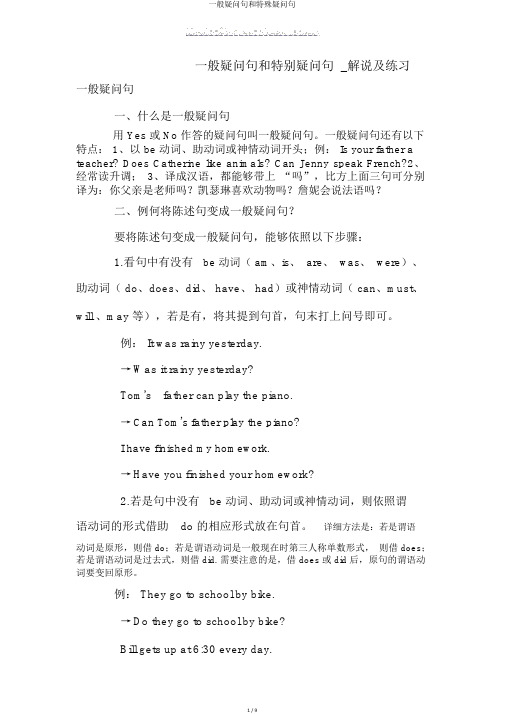
一般疑问句和特别疑问句 _解说及练习一般疑问句一、什么是一般疑问句用 Yes 或 No 作答的疑问句叫一般疑问句。
一般疑问句还有以下特点: 1、以 be 动词、助动词或神情动词开头;例: Is your father a teacher? Does Catherine like animals? Can Jenny speak French?2、经常读升调;3、译成汉语,都能够带上“吗”,比方上面三句可分别译为:你父亲是老师吗?凯瑟琳喜欢动物吗?詹妮会说法语吗?二、例何将陈述句变成一般疑问句?要将陈述句变成一般疑问句,能够依照以下步骤:1.看句中有没有be 动词( am、is、 are、 was、 were)、助动词( do、does、did、 have、 had)或神情动词( can、must、will 、may 等),若是有,将其提到句首,句末打上问号即可。
例: It was rainy yesterday.→Was it rainy yesterday?Tom's father can play the piano.→Can Tom's father play the piano?I have finished my homework.→Have you finished your homework?2.若是句中没有be 动词、助动词或神情动词,则依照谓语动词的形式借助do 的相应形式放在句首。
详细方法是:若是谓语动词是原形,则借 do;若是谓语动词是一般现在时第三人称单数形式,则借 does;若是谓语动词是过去式,则借 did. 需要注意的是,借 does 或 did 后,原句的谓语动词要变回原形。
例: They go to school by bike.→Do they go to school by bike?Bill gets up at 6:30 every day.→Does bill gets up at 6:30 every day?The students saw a film yesterday.→Did the students see a film yesterday?三 .陈述句变一般疑问句应注意的事项陈述句变成一般疑问句除了依照上述规则以外,还应注意以下几点:1.若是陈述句中有第一人称,则变问句时最好要变成第二人称。
一般疑问句 和特殊疑问句

一般疑问句和特殊疑问句1. 概念:一般疑问句就是提问所述情况是否符合事实,是还是不是,对还是错。
特殊疑问句则是询问其语句中所缺失的部分,或者说,是要求得到那部分你所不知道的信息:什么,哪里,怎么样,多少,等等。
2. 疑问句的构成一般疑问句的构成当原本的陈述句中有be动词或者情态动词时,可直接将be动词或者情态动词提至句子前,但如遇主语是第一人称的,最好将其置换成第二人称。
如:I’m in Class 2, Grade 1. →Are you in Class 2, Grade 1? 你是在……吗?be动词提前I can spell it. →Can you spell it? 你会拼写它吗?情态动词提前There are some books on my desk.→Are there any books on your desk?如果句子里没有BE动词和情态动词,谓语的第一个动词只是一般动词(实义动词)的时候,变一般疑问句,就要用助动词DO来凑了。
而且,"do" 将取代原实义动词的表达时态之任务。
即原本句子里的动词是什么时态,变第三人称单数形式加-s了?变过去式了?那么这些变化都转移到"do"上面,原动词变回原型。
She lives in Beijing. →Does she live in Beijing? 她住在北京吗?I like English. →Do you like English? 你喜欢英语吗?如果在原本的陈述句中,有some的存在,即“一些”。
那么变为一般疑问句,则要换为“any”.There are some books on my desk. → Are there any books on your desk?我桌子上有一些书. 你桌子上有任何书么?解释起来就是“你有任何一点的东西么?”为什么不用some了?因为我连你有没有都不清楚,还怎么确定你是有多少?所以只好用any,这里做“任何”讲。
一般疑问句和特殊疑问句英语讲解
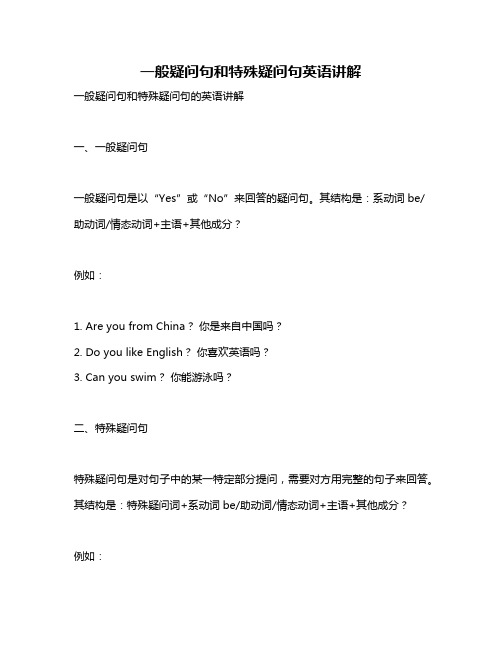
一般疑问句和特殊疑问句英语讲解
一般疑问句和特殊疑问句的英语讲解
一、一般疑问句
一般疑问句是以“Yes”或“No”来回答的疑问句。
其结构是:系动词be/助动词/情态动词+主语+其他成分?
例如:
1. Are you from China?你是来自中国吗?
2. Do you like English?你喜欢英语吗?
3. Can you swim?你能游泳吗?
二、特殊疑问句
特殊疑问句是对句子中的某一特定部分提问,需要对方用完整的句子来回答。
其结构是:特殊疑问词+系动词be/助动词/情态动词+主语+其他成分?
例如:
1. What is your name?你叫什么名字?
2. Which city do you live in?你住在哪个城市?
3. How old are you?你多大了?
特殊疑问句的“特殊疑问词”包括:what(什么)、when(时间)、where(地点)、why(原因)、how(怎么样)等。
这些词用来引导特殊疑问句,帮助提问者获得具体的信息。
英语一般疑问句与特殊疑问句

一般疑问句
Wh---Questions
单击此处添加副标题
一般疑问句
主要由be动词、情态动词或助动词来开头。 (1) Is Han Mei in Class Four? (2) Can you spell your name, please? (3) Does he go to school every day? be动词: am, is, are, was, were 情态v: can, could,may, might, will, shall,would, must, need, should, … 助动词: do does did has/have(已经) some在否定句, 疑问句中 要变成 any
I’d like to join Music Club.
What class are you in?
I’m in Class 5.
What colour do you want?
I want purple.
What language can you speak?
I can speak English.
Whose the laptop is ?
Jennifer has a pair of earrings.
Who has a pair of earrings ?
The flowers are in the flower pot.
Where are the flowers ?
Practice
03
I like football. (对划线部分提问)
02
What animal do you like?
04
What sports do you like?
特殊疑问句和一般疑问句
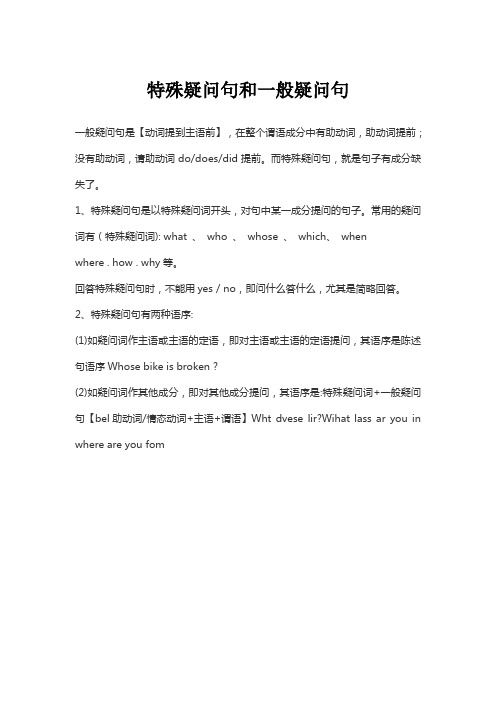
特殊疑问句和一般疑问句
一般疑问句是【动词提到主语前】,在整个谓语成分中有助动词,助动词提前;没有助动词,请助动词do/does/did提前。
而特殊疑问句,就是句子有成分缺失了。
1、特殊疑问句是以特殊疑问词开头,对句中某一成分提问的句子。
常用的疑问词有(特殊疑问词): what 、who 、whose 、which、when
where . how . why等。
回答特殊疑问句时,不能用yes / no,即问什么答什么,尤其是简略回答。
2、特殊疑问句有两种语序:
(1)如疑问词作主语或主语的定语,即对主语或主语的定语提问,其语序是陈述句语序Whose bike is broken ?
(2)如疑问词作其他成分,即对其他成分提问,其语序是:特殊疑问词+一般疑问句【bel助动词/情态动词+主语+谓语】Wht dvese lir?Wihat lass ar you in where are you fom。
一般疑问句和特殊疑问句有什么区别
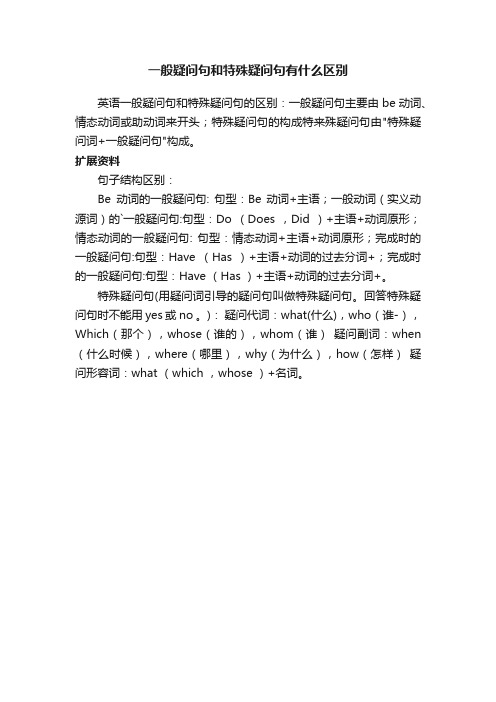
一般疑问句和特殊疑问句有什么区别
英语一般疑问句和特殊疑问句的区别:一般疑问句主要由be动词、情态动词或助动词来开头;特殊疑问句的构成特来殊疑问句由"特殊疑问词+一般疑问句"构成。
扩展资料
句子结构区别:
Be动词的一般疑问句: 句型:Be 动词+主语;一般动词(实义动源词)的`一般疑问句:句型:Do (Does ,Did )+主语+动词原形;情态动词的一般疑问句: 句型:情态动词+主语+动词原形;完成时的一般疑问句:句型:Have (Has )+主语+动词的过去分词+;完成时的一般疑问句:句型:Have (Has )+主语+动词的过去分词+。
特殊疑问句(用疑问词引导的疑问句叫做特殊疑问句。
回答特殊疑问句时不能用yes 或no 。
):疑问代词:what(什么),who(谁-),Which(那个),whose(谁的),whom(谁)疑问副词:when (什么时候),where(哪里),why(为什么),how(怎样)疑问形容词:what (which ,whose )+名词。
- 1、下载文档前请自行甄别文档内容的完整性,平台不提供额外的编辑、内容补充、找答案等附加服务。
- 2、"仅部分预览"的文档,不可在线预览部分如存在完整性等问题,可反馈申请退款(可完整预览的文档不适用该条件!)。
- 3、如文档侵犯您的权益,请联系客服反馈,我们会尽快为您处理(人工客服工作时间:9:00-18:30)。
陈述句含义:用于陈述事实和观点的句子。
陈述句包括肯定结构和否定结构。
This is a desk.(肯定结构)He can sing and dance.(肯定结构)He doesn’t have a computer.(否定结构)There aren’t any pictures.(否定结构)肯定句变否定句:1.be动词的否定式be:am ,is ,are,was were构成否定式时,一律在后面加否定词notHe is reading. →He is not reading.They are from China. →They are not from China.2. 情态动词的否定式情态动词:can, could, must , may, might, will, would,shall,should , need,……构成否定式时,一律在情态动词后面加否定词notI can swim. →I can not swim.You should arrive here on time.→You should not arrive here on time.构成否定式时,要借助助动词do, does, did,在一般现在时中用do或者does,在一般过去时中用did。
结构为:主语+don’t\doesn’t\didn’t+动词原形+其它I like pop music. →I don’t like pop music.She often swims. →She doesn’t often swim.He handed in his homework.→He didn’t hand in his homework.1She is swimming. Is she swimming?2)谓语中含有助动词have/has/had (通常是在现在完成时和过去完成时中:have / has / had + 过去分词)规律:Tom has finished his homework. →Has Tom finished his homework?I have eaten breakfast. →Have you eaten breakfast?3)谓语动词中含有情态动词时。
规律:He can swim. →Can he swim?I should go to school. →Should I go to school?4)谓语动词是行为动词,必须在句首加上助动词。
加上这些助动词后,句子中谓语动词必须用原形。
规律:Tom built a science lab himself lab when he is 20 years old.→Did Tom build a science lab himself lab when he is 20 years old?She likes drinking milk. →Does she drink milk?They often swim. →Do they ofen swim.注意:1.把肯定句改成一般疑问句时,要注意句中是否有already,some,something,somebody等词,如果有,就要进行改变。
already,some,something,somebody等分别改成yet,any,anything,anyone She has already finished her work. →Has she finished her work yet? 2.注意人称的变化。
My mother is a teacher.Is your mother a teacher?3.以下问句固定的回答:Is this/that/a/an+物--------yes,it is./No,it isn’t.Are they /those/these…?---------Yes,they are./No,they aren’t.特殊疑问句含义:以疑问代词或疑问副词开头,提出疑问的句子。
基本结构:特殊疑问词+一般疑问句注意:A疑问词的选择:1.疑问代词who谁,whom谁,whose谁的,which哪些(个),what什么2. 疑问副词(作状语)2when何时,where何地,why为什么,how如何,how much多少(不可数) ,how many多少(可数),how long多久,how old多大年纪,how far多远。
1)问“谁”用who或whomLeilei is a doctor. Who is a doctor?(对主语提示用who,对宾语提问用who,whom均可)2)问“谁的”用whoseThis is his book. Whose book is this?3)问“哪个”用which,whatI like this one among thesree three.Which do you like among these three?I like English best. What do you like best?4)问“时间”用when或what timeI go there in the morning ? When do you go thereIt is 4 o’clock. What time is it?(when既可以对时间点提问,也可对年、月、日等时间提问;what time通常只对时间点提问)5)问“地点”用whereThe ball is under the bed. Where is the ball?6)问“原因”用WhyHe did not come because he was ill.Why did not he come?7)问“方式”或“身体状况”用howHe did it in that way. How did he do it.3选择正确的单词填空1._____ is that pretty girl? She is my sister.2._____ are Jack and Tom? They are behind you.3._____ do you go to school? I go to school from Monday to Friday.4.______ are the apples? They are 10 yuan.6._____ is your mother? She is a teacher.7._____ are you going? We are going to the bakery(面包坊).8.______ did Jim and Wendy travel to Beijing ? They traveled there by plane9. ____________is the skirt? It’s red.10. _________ do you go to the cinema? Twice every week.11. did you be late for school? Because I got up late.一.将下列句子改成一般疑问句:1. It is a lovely dog.________________________________________2. I am a doctor. _____________________________________3. We are classmates. _____________________________________4. I play computer games every night._____________________________________5. He likes English. _____________________________________6. His father goes to work by bus._____________________________________7. I want a new toy. _____________________________________8. She finished reading the books two days ago.____________________________9. She has some story book. _____________________________________10. I can dance and sing. _____________________________________411 He has some brothers. _____________________________________12. They have gone to Beijing. _____________________________________13. She has finished her homework._____________________________________把肯定句变为否定句1. His father is an English teacher._____________________________________.2. These cats are crying.(喊叫)_____________________________________.3. They can swim. _____________________________________.4. They went to work on foot last year.___________________________________ .5. He likes English. _________________________________________6.They were students. .7.She was shy.I.对画线部分提问、1. They bought a new bike yesterday.____________________________________________________2. She is a nurse .____________________________________________________3. She is my teacher.____________________________________________________4. He bought the red one .____________________________________________________5. It is my coat .____________________________________________________6. I am looking for my sister .____________________________________________________7. I get up at six .____________________________________________________8. I am from Hubei .____________________________________________________9. I went to school late because I got up late.____________________________________________________10.They are five yuan .______________________________________________________5一、将下列句子变成一般疑问句1.Mr .Wang is 30 years old.2.The elephant’s ears are long.3.We like birds.4.I can sing and dance.5.Tom has finished his homework.二、对划线部分提问1.1)They are cleaning their classroom now.They cleaning now.2)he often has supper at home.He often supper?3)I got up at 6 o’clock this morning.you get up this morning .4)he finished the book last Sunday.He the book?5)I didn’t go to school because I had a bad cold.you go to school?6)You had better take the No.3 bus.Bus had I better take?7)He is feeling well.He feeling?68)He comes to China once a year.he come to China?9)They were drawing a horse when I came in.they when I came in? (10)Hundreds of people died in the war.people in the war. (11)She watches TV every night.she watch TV.(12)It is about 10 km away from here.It from here?(13)the shirt cost 200 yuan.the shirt cost?2.1)He is my father.2)They are under the tree.3)I often watch TV after dinner.4)Superman flies in the sky.5)Alan likes to play with Bill.6)Joe’s father plays badminton every week.7)The supermarket is near the school.8)Jennifer has a pair of earrings.9)I put the gold fish into the fish tank.10)The monkey sleeps at night.7。
